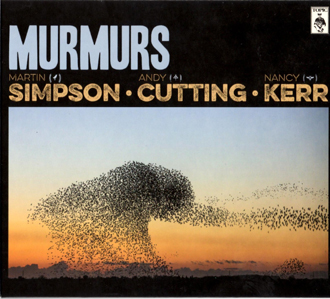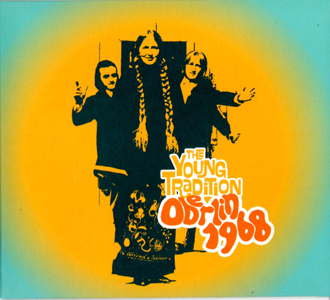Giant Donut Discs ® – May 2015
30. 5. 2015 | Rubriky: Articles,Giant Donut Discs
 [by Ken Hunt, London] This month’s collection is a mixture of project-related listening and, that luxury, music listened to just for pleasure. In the latter case that doesn’t happen too often. Rojda, Little Feat, Martin Simpson, Andy Cutting & Nancy Kerr, Peggy Seeger, Scarlett O’ & ‘the little big band’, Jackson Browne & David Lindley, Jyotsna Srikanth, The Young Tradition, Kirsty MacColl and Tritonus.
[by Ken Hunt, London] This month’s collection is a mixture of project-related listening and, that luxury, music listened to just for pleasure. In the latter case that doesn’t happen too often. Rojda, Little Feat, Martin Simpson, Andy Cutting & Nancy Kerr, Peggy Seeger, Scarlett O’ & ‘the little big band’, Jackson Browne & David Lindley, Jyotsna Srikanth, The Young Tradition, Kirsty MacColl and Tritonus.
Saliho Û Nûrê – Rojda
 It is part of my life plan at least once a year to be introduced to new musical epiphanies, not just musical experiences – true, life-changing epiphanies. It doesn’t happen every year. 2015 seems as if potentially it has already produced one. I listened – as in really, really listened – to Rojda as part of research for a project, TFF Rudolstadt 2015. She was a completely blank canvas, an unknown musical quantity to me. Nevertheless, her music immediately intrigued immensely. Immensely. Her combination of passion, emotional delivery and technique blew me away.
It is part of my life plan at least once a year to be introduced to new musical epiphanies, not just musical experiences – true, life-changing epiphanies. It doesn’t happen every year. 2015 seems as if potentially it has already produced one. I listened – as in really, really listened – to Rojda as part of research for a project, TFF Rudolstadt 2015. She was a completely blank canvas, an unknown musical quantity to me. Nevertheless, her music immediately intrigued immensely. Immensely. Her combination of passion, emotional delivery and technique blew me away.
Rojda Aykoç is a Kurdish singer from Turkey’s South-eastern Anatolia Region. Born in 1978, she sings Kurdish art music with a remarkable gift for melismatic richness, tempo and intonation. I had never encountered her before. But, as it were, willed to find. I first touched upon Kurdish music through its German diaspora while writing my entry for the Germany chapter for the final Rough Guide to World Music (2009) and in 2014 in a little Austrian town on the banks of the Danube called Krems an der Donau at the annual Festival Glatt&Verkehrt I encountered Nishtiman. They caused me to recalibrate Kurdish art music. When does one’s musical education ever end? Well, personally I hope never.
After studying music in Istanbul and making music in public, professional capacities (for example, with the band, Koma Gulen Xerzan), Rojda Aykoç turned solo in 2006. In February 2010 she fell foul of the Turkish authorities. They arrested and sentenced her for singing a Kurdish folk song, holding her as having spread “propaganda for an illegal organisation”. Saliho Û Nûrêthough appears here purely on musical grounds. The English counterpart of the Kurdish and Turkish notes is eccentric or idiomatic and I feel as if I would be walking on quicksand too much were I drawing on them. Above all else it was the singing and music on Kezî to which I responded. And Saliho Û Nûrê (Saliho and Nûrê [two names]) in particular. From Kezî (MIR no number, no barcode, undated [2014])
More at http://www.rojda.biz and kommuzik.net, www.mirmultimedia.de
Spanish Moon – Little Feat
Reading my good mate Joel McIvor’s obituary of the bass player and songwriter Louis Johnson got me thinking. Johnson was one of the finest and most heard bass players in popular music. His playing can be heard on recordings by the Brothers Johnson, George Benson, Paul McCartney, Aretha Franklin and, most particularly of all, Michael Jackson. It got me thinking about Little Feat’s Spanish Moon. On that song how Kenny Gradney set – and sets up – the sinewy-ness and underlying menace of that song so brilliantly from the get-go and the remains throughout the song’s unfolding.
Kenny Gradney explained its origins to me in an interview in June 2012 for the McIvor-edited Bass Player. “[Little Feat percussionist] Sam Clayton, myself and Freddie [White] [youngest son of Maurice White and Verdine White from Earth, Wind & Fire] were in the rehearsal room that we had on Cahuenga [Boulevard] and we were jamming. We were jamming this groove and in walked [Little Feat guitarist] Lowell [George] and [says] ‘Don’t stop!’ [Little Feat keyboardist] Billy [Payne] walks in and turns on a tape recorder and Lowell started singing that song verbatim while we were just grooving along. That’s where that song came from.”
For me, Spanish Moon is a little bit of Brecht/Weill with funk. If you only want to listen to one Lowell George-era Little Feat album, try this one, From Feats Don’t Fail Me Now (Warner Brothers 7599-27284-2, 1974)
Joel McIvor’s obituary of Louis Johnson from The Guardian of Monday, 25 May 2015 is here: http://www.theguardian.com/music/2015/may/24/louis-johnson
Toy Soldiers – Simpson • Cutting • Kerr
The buzz preceding Murmurs from the UK-based trio of Martin Simpson, Andy Cutting & Nancy Kerr made it one of the most eagerly awaited releases of 2015 in the Hunt household. One of the themes that occurs is that of wildlife and the natural world. Both are long-lived passions of Martin Simpson’s. The album title is a cross-reference to Graham Catley’s cover photograph of a murmuration of starlings. Starling flocks in flight have the appearance of solid air in motion, weaving and swooping in their many thousands.
Martin Simpson and I have had dozens of conversations about birds over the thirty years-plus that we have known each other. Toy Soldiers dwells on a subject dear to our hearts. Namely, the whole slaughter of birds reared specifically for sport in the British Isles. There are not merely the game birds that are beaten and driven out of cover in order to be blasted out of the skies but also the so-called vermin corvids and raptors, the carcasses of which used to be hung as warning trophies using fences as makeshirt or semi-permanent gibbets all over the British countryside in the good old days This was before the warnings in Rachel Carson’s Silent Spring (1962) bit home and agriculturists did want they liked in and to the countryside. In a lovely turn of phrase in Toy Soldiers, Simpson dubs this practice “gamekeeper’s Calvary”. The song’s title refers to pheasants. The notes widen the subject to bring in the Tory government’s increased subsidy for maintaining grouse moors. From Murmurs (Topic TSCD591, 2015)
More about Andy Cutting at http://www.andy-cutting.co.uk/, about Nancy Kerr at http://nancykerr.co.uk/and about Martin Simpson at http://www.martinsimpson.com/
Do You Believe in Me? – Peggy Seeger
This song by Peter Berryman & Lou Berryman was as if made for Peggy Seeger’s mouth. The lyric is full of twists and bubbles along at a fair old pace. It has sequences when it becomes a bugger of a tongue-twister and a test of breath control techniques. Peggy negotiates its intricacies brilliantly. From Everything Changes (Signet Music SM1, 2015)
More at http://www.peggyseeger.com/
Das muß ein Stück vom Himmel sein – Scarlett O’ & ‘the little big band’
This is a song by Werner Richard Heymann (1896-1961). It was Scarlett O’, formerly Scarlett Seeboldt of the East German folk group Wacholder, who introduced me to his writing and life what seems like a very long time ago. She has one of the most lustrous, most limber voices ever to have come out of Germany, whether either side or reunified.
This song appeared in the 1931 Ufa film Der Kongreß tanzt (the English-language title of which is The Congress Dances). Ufa was the Potsdam-based Universum Film AG film company. (Potsdam is situated to the west of Berlin and is the site of a museum dedicated to Ufa’s film-making legacy and history.) The film was made in three versions – a German, English and French one – with Ufa playing for high stakes in a deliberate drive to counter the supremacy of Hollywood on the international market.
Just love this song. That must be a little bit of heaven, as the song sings. Couldn’t get it out of my head. I spontaneously wrote the title line in a guest book in an idyllic place in Hohenwarte in East Germany. One of those communities in a valley miles away from anywhere of any size. A place where you wake up and maybe twenty species of birds are singing, where slowworms are basking in the early morning sun when you do the morning’s composting, and you click your ruby slippers and hope there are a few of the last Knupperkirschen (Germany’s to-die-for cherries) ripe and within reach. Das muß echt [genuinely] ein Stück vom Himmel sein. From Das muß ein Stück vom Himmel sein (Duophon 01 89 3, 2000)
More in German and English at http://www.scarlett-o.de/
Love Is Strange/Stay – Jackson Browne & David Lindley
There are a small number of musicians I am willing to cross continents to see perform. Naming them would be churlish. Without question is David Lindley. Lindley has never failed to bowl me over. I have seen him sound check as a guest and in two run-throughs nail a style. (In the case in mind he needed one, the band needed two.) I have seen him turn a major technological mishap into an opportunity for a display of prestidigitation while a complete desk reboot went on. I’ve known David Lindley since the early 1980s as a friend. His music only continues to inspire me on varying levels.
It was through David that I got to meet Jackson. Each meeting, always a rare thing. A rare thing in another sense of rare. Just love this performance. Jackson: “Hey, David.” “Yeah, mon?’ “How d’you call your lover?” Dave: “My what?” […] “Hey momma, cumovahere/Say hallo to Elvis./Like to meet Elvis? I know Elvis/A friend of mine.” It gets more complicated.
I want this blasting out at my funeral. I want it to bring smiles to faces the way it was with John B. Spencer’s coffin. When it was brought in for his humanist service, atop it was rhubarb and sundry allotment produce. When ‘he’ arrived, it prompted me to cry out Goonishly, ‘Rhubarb, rhubarb!’ John and I had talked at length about funereal generalities but the rhubarb was a surprise sprung and one I loved. People burst spontaneously into laughter. Which would have tickled John. Hard to imagine a funeral without a stick or two of rhubarb on a coffin now. From Love Is Strange (Inside Recordings INR5111-0, 2010)
Ecstasy – Jyotsna Srikanth
It was a beautiful early summer’s day in May around noon. Warm in an early English summer’s way – a pleasant 18-20 Centigrade. Driving along beside the Mogador sewage treatment plant with the window down (not something recommended during high summer with the wind in the wrong direction), a nightingale burst into song. A few seconds later a second one started singing and its song fit marvellously well into Karnatic violinist Jyotsna Srikanth’s Ecstasy. It’s a moment I shall treasure. Maybe it should have been a bulbul but a nightingale can do as a substitute in Britain. The bulbul is popularly viewed as the nightingale of India. And, yes, it is a cliché. Still in that moment it was more than a mismatch or a fleeting connect between a nightingale, a kinda take on Ewan MacColl’s Dirty Old Town and Jyotsna Srikanth’s South Indian violin. From Bangalore Dreams (Theme Music USR0006, 2015)
More at http://www.indianviolin.eu/Jyotsna.html
 Byker Hill – The Young Tradition
Byker Hill – The Young Tradition
Peter Bellamy, Heather Wood and Royston Wood were the Young Tradition. They were a force of nature and quite unlike any other unaccompanied folk harmony group of the late 1960s. (And, yes, I saw them live.) One of the underreported aspects of their music-making was the concision of their songs. The Oberlin College, Ohio recordings ram that home.
In the studio it was generally a case of brace and deliver. On stage a song might barely fluctuate in length within a narrow range of seconds. Self-indulgence lasted very few bars. One of the side-performance issues here is how little the Young Tradition deviated from that norm. This song reinforces that. Byker Hill was a song that Martin Carthy with Dave Swarbrick also earmarked as theirs. Byker Hill was perhaps the song when I realised that utterly different arrangements made complete and utter sense when it came to the English folk canon. No preference, one over the other. This song was a major part of my folk education. This album pinpoints how they communicated. Heather Wood adds a neat Janis Joplin shanty aside in the CD booklet notes. From Oberlin 1968 (Fledg’ling FLED3094, 2013)
More at http://www.thebeesknees.com/category/the-young-tradition/
In These Shoes? – Kirsty MacColl
I was just sitting there, minding my own business, writing and proofing copy in The Angel & Crown on that pedestrian side-lane leading up to church – whatever it’s called – in Richmond Upon Thames. (“Built in 1547, our building has been part of the Richmond landscape for centuries. Once a Post Office, then a sweet shop, it’s been a Fuller’s pub since 1876.”) All of a sudden, this song swamped my consciousness and I had to stop work and start listening. It made me feel hyper-alive. I stopped writing.
During her time Kirsty MacColl (1959-2000) was one of the truly most memorable singers ever to emerge from the UK’s fractured music scenes. Listening to song, as if out of the blue, floored me. From Tropical Brainstorm (Instinct Records INS557-2, 2001)
 Zur blawen Entten – Tritonus
Zur blawen Entten – Tritonus
Across Europe there is a myriad of musical realms in which contemporary takes on tradition-based folk musics are commonplace. Many are barely known outside their home patches, their regional cultural borders or national boundaries. Many acts – part-time or semi-professional – stay local by choice. Through decades of working at Tanz&FolkFest Rudolstadt, it has been a privilege to experience at first hand scores of regional folk acts from Belgium to Ukraine, Sardinia to Sweden that never reached British shores.
Yet despite coming with a family tree stretching back to the mid-1970s, to my shame neither hide nor hair of the Swiss folk group, Tritonus ever registered. On the strength of the genuinely exciting urbanus they are a force to be reckoned with. Zur blawen Entten (‘At the blue ducks’) derives from a Zurich inn name and the prospect of drinking in a place by that name is like a glass brimming over. It is a Zwiefacher, a dance from the Alpine Lands that switches between 3/4 and 2/4. From urbanus (Zytglogge ZYT 4966, 2015)
More at http://www.tritonus.ch// in German, English, French and Italian.
The copyright of all images lies with the respective photographers, companies and image-makers.